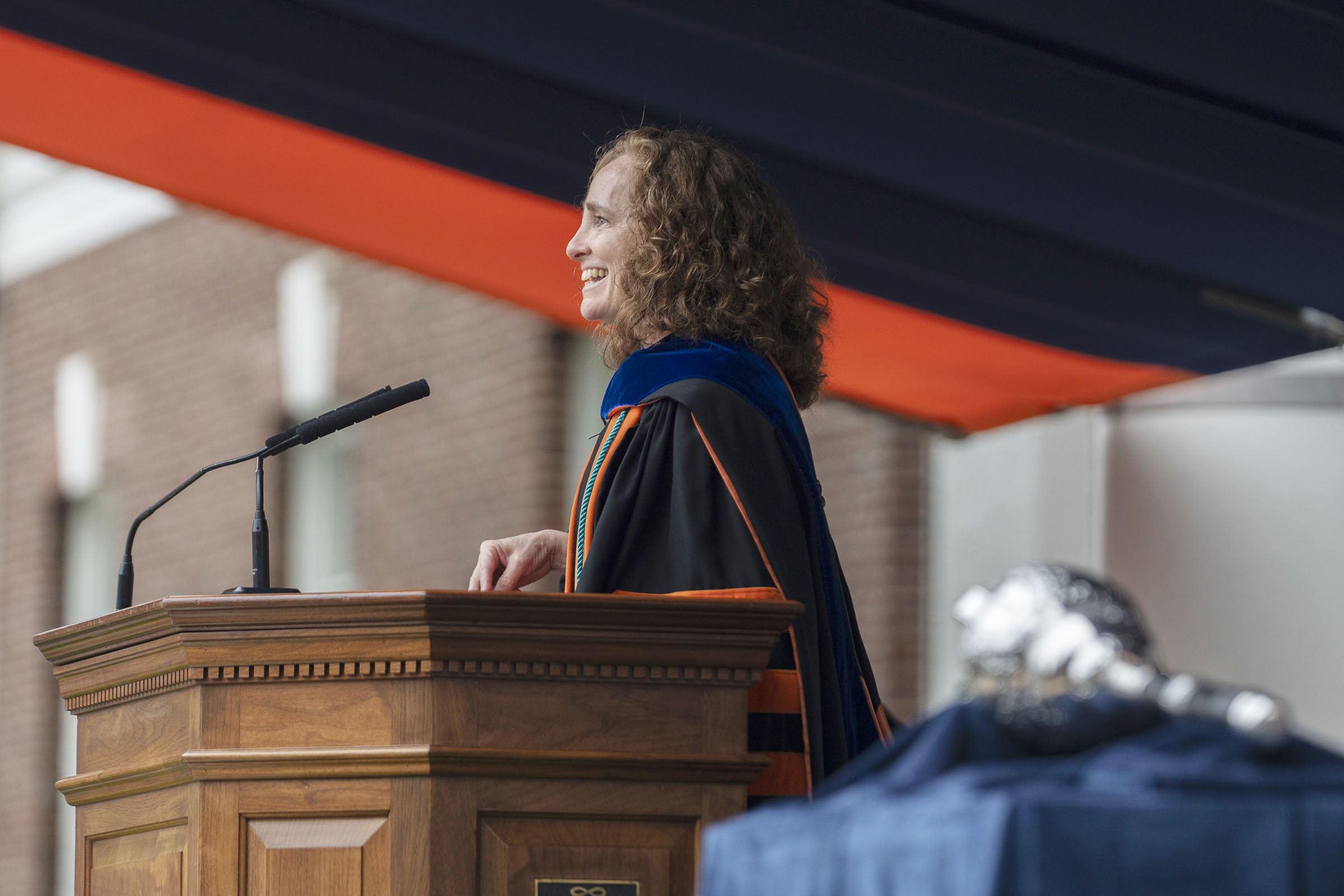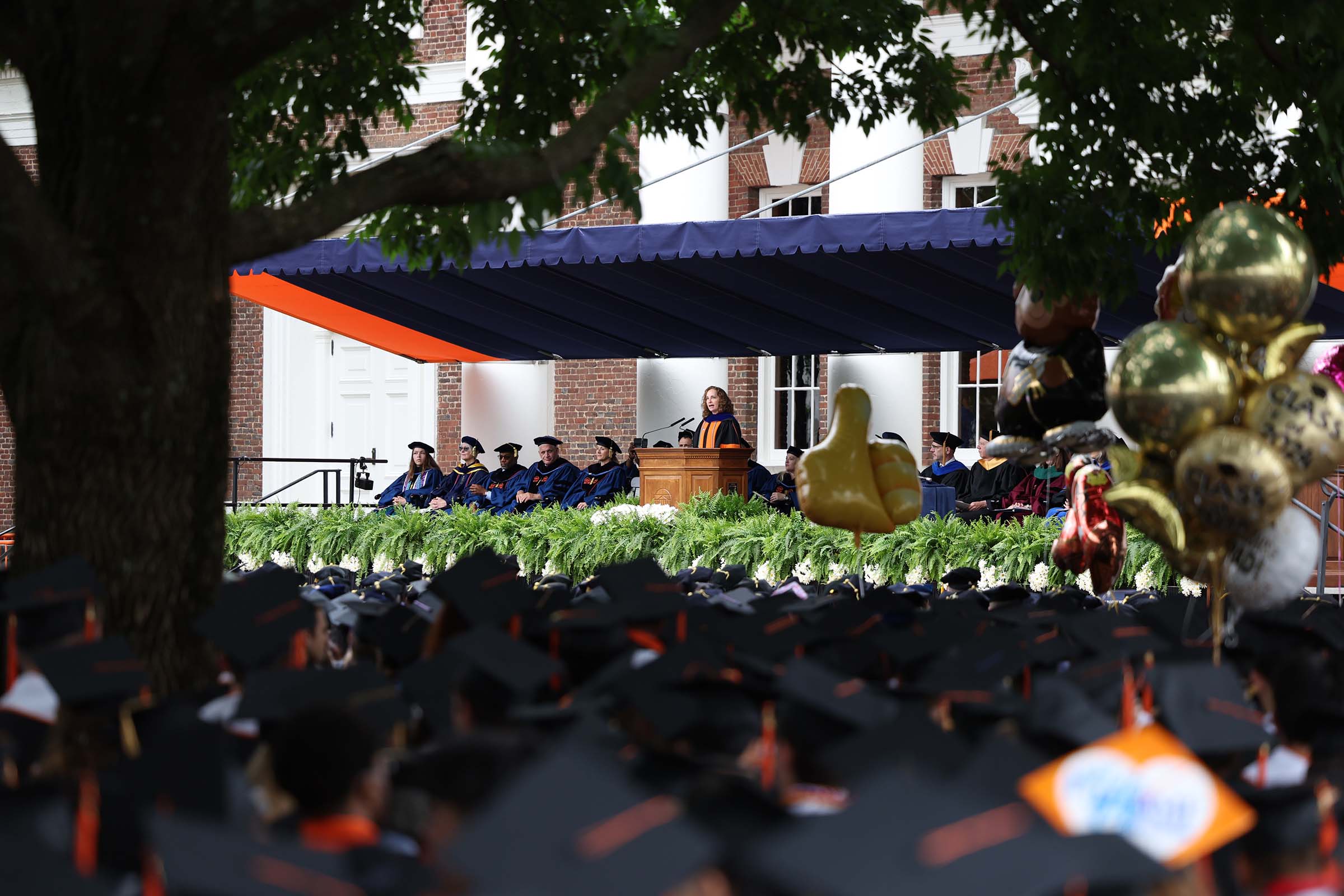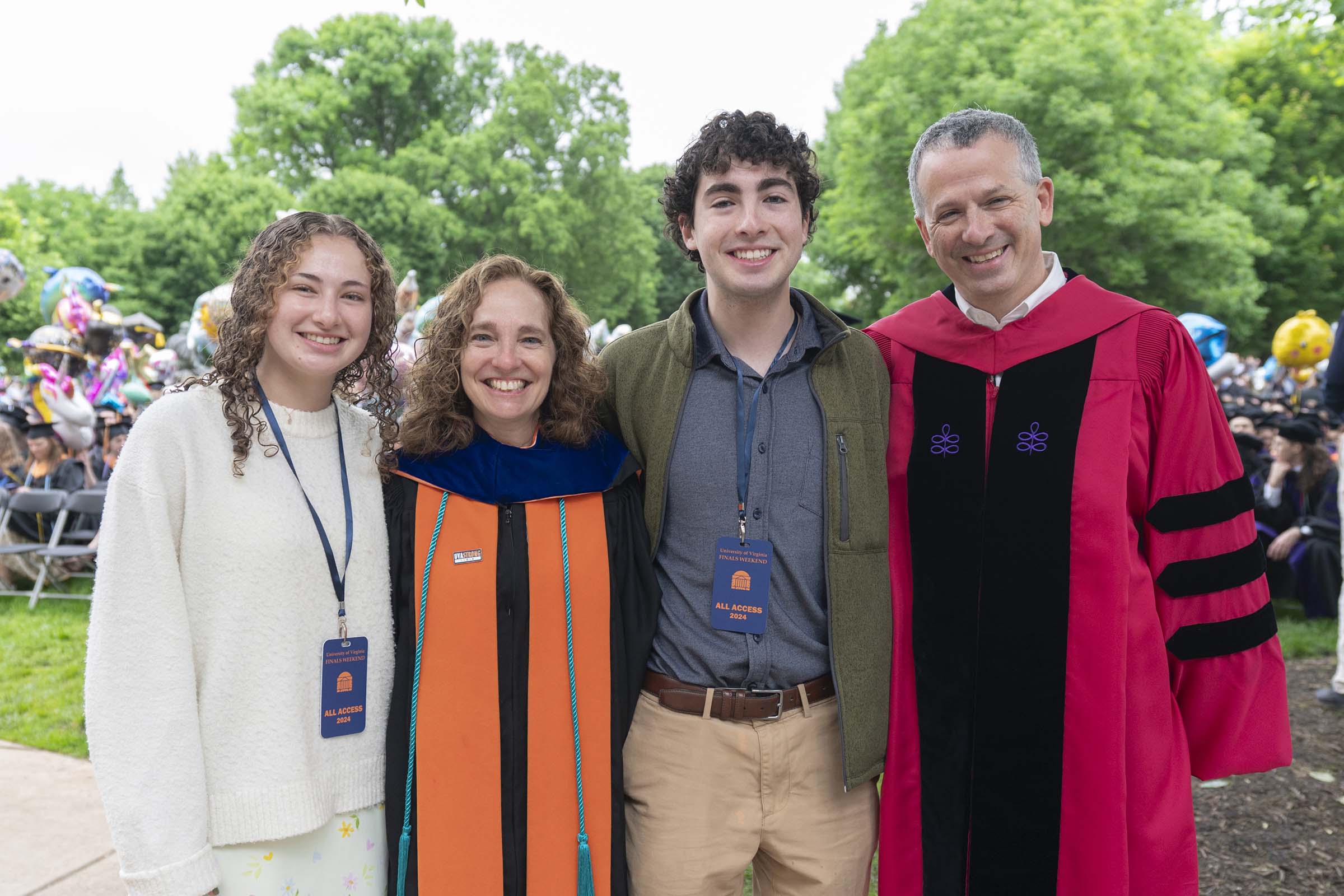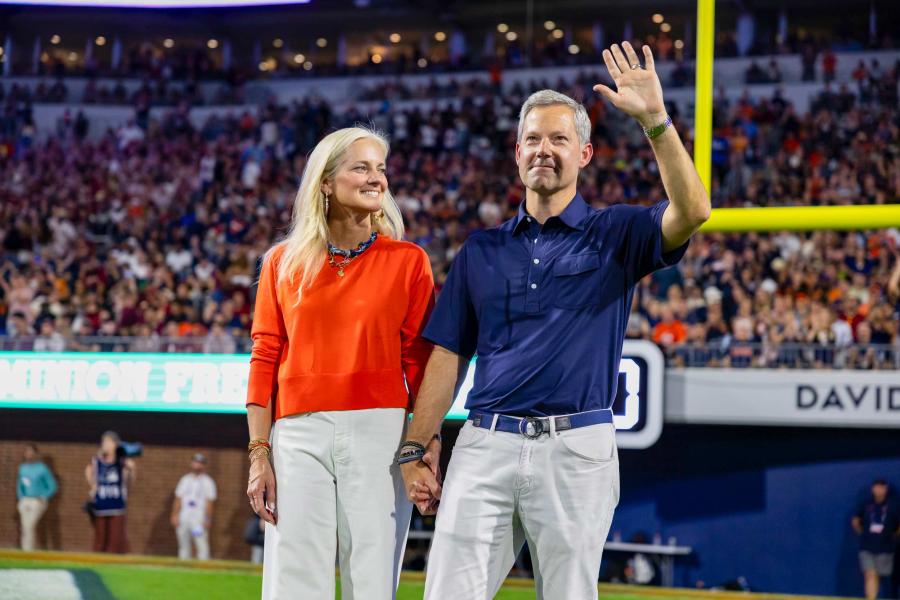The text of School of Law Dean Risa Goluboff’s address to the University of Virginia’s Class of 2024, delivered May 19 on the Lawn:
Outgoing Law Dean Challenges Graduates: ‘If Not You, Who?”

Outgoing School of Law Dean Risa Goluboff delivers the Sunday keynote speech to UVA graduates in the final of two commencement ceremonies. (Photo by Erin Edgerton, University Communications)
Thank you, Rector Hardie, for that lovely introduction. Thank you, President Ryan, for inviting me to speak today, and thank you to everyone who makes this amazing day possible.
I am truly honored to be here and delighted to see all of you, graduates, families, friends, members of the Board of Visitors, faculty, university administrators and staff. As Rector Hardie mentioned, I am about to step down from my leadership role and return to the Law School faculty. So this is my last assignment as dean – I’m just announcing that now, President Ryan. It has been a hard one!
So, in my effort to get it right, I actually wrote three different mini-speeches – this first one is about this occasion and some personal reflections I have on transitions, the second one is about the historical moment of my years as dean, and the third one is about this place, UVA. I’m a both/and person, so I’ve decided to give them all – maybe I should say I’m a “both/and/and” person. Don’t worry, there are many speeches! OK, here is the first.
This speech is about this occasion, commencement, which marks a major transition in your lives, and, like you, in mine. I am in transition today, too. Transitions present an opportunity to reflect on where we’ve come from and where we are going. And in particular, I have been thinking a lot lately about the voices that have guided me to this day and will guide me in the future. And I want to share a few with you on this special occasion.
The first voice I want to share is my mother’s. Now, I’m guessing that if you’re already thinking about the voices that guide you, your mother’s might be on many of your lists. I return again and again to one of the things that my mother has said to me over the years: “If not you, who?”
It was that voice that has always prompted me to raise my hand in class, or to move to South Africa after college without knowing a soul there.
My mother’s faith in my abilities is limitless. If I asked her whether I should pursue my dream of playing basketball for Tony Bennett, I have no doubt that despite the fact that one, I am a woman; two, I am not quite 4 feet, 11 inches tall – yes, I’m standing on a riser; and three, I have basically no hand-eye coordination, my mother would reply, “If not you, who?”
That I might occasionally overreach, and yes, fail, when I act on that voice is part of the point. “If not you, who?” prompts me to take risks. It also reminds me that I belong in the places those risks make possible. “If not you, who?” tells me not to question why I should be in every room I enter. Finally, it’s a prompt to take responsibility: “If not you, who?” If I want something to happen, then I have to take the initiative. It, whatever “it” is, is on me.
The second voice I’ve been thinking about lately belongs to one of my professors, Dirk Hartog. I’m guessing – maybe I’m hoping – that you might have a professor on your list, too. Whenever I was writing a paper and I was stymied, I would plop down in his office and I would explain – sometimes in more detail than was necessary – why nothing made any sense. I didn’t understand the readings, or what I was finding in the archives wasn’t what I expected to find.
I know you’ve all been there, hitting a wall, unable to move to the next step – whether it’s a paper, or some computer code, or a structural problem with something you’re trying to build, or a diagnosis. And after I finally stopped talking, he would say, “The problem is the thing that’s interesting.” By which he meant, you can’t ignore the problem, or avoid it. You should focus on it and listen to what it’s telling you; focus on the disjuncture between the expected and the actual. Bring the problem to the surface, and that’s where you’ll find your own perspective, your own vision.
This is true not only in writing or coding or designing, but in life. Problems are the stuff of life, not things to avoid. They are what make life challenging and meaningful, and what spark innovation and creativity. “The problem is the thing that’s interesting.”
The next voice is that of one of my brothers, and he says, “Ask about the big yellow flower.”
Now, I know this sounds a little strange, that is not a common saying; you haven’t missed that in your growing-up, but stay with me. My brother is a writer, so he sets the following scene: You walk into a room full of people, and your eye is instantly drawn to someone wearing a hat with a huge yellow flower affixed to the front. It’s impossible to miss, and that’s the point, and my brother poses the question, “Do you ask about the flower?”
I had been aware of this phenomenon – the person wanting you to ask a particular question –before my brother described it in precisely this way. And I will say that – and I’m not proud when I confess this to you – my instinct had often been not to ask. I kind of resented that they were trying to commandeer my attention, until the day my brother said, “I always ask about the big yellow flower.” It’s part of that person’s story. And my brother wants to know their story. He wants to know who they are, and why the flower.
This conversation had a profound effect on me, and I think back to it all the time. It made me realize that in asking about the big yellow flower, in learning people’s stories, we show, and find, our common humanity. That has been especially hard to do lately. There are so many forces pushing us apart, emphasizing our differences from one another, rather than our commonalities. You can’t know me just by knowing a few facts about me, as important as those facts may be. But you can know me by asking about my big yellow flower, and I can know you the same way.
The next voice belongs to Countess Hughes, from Housing and Residence Life here at UVA. Countess is the person who assigned you to your dorm rooms – for better or for worse, you can applaud or no – and she’s an acquaintance of mine. Countess has many words of wisdom, and the one I come back to all the time is, “What did they say next?”
Her question comes up when someone complains about what someone else said that was upsetting or offensive or that they simply disagree with. “What did they say next?” prompts grace, curiosity and engagement, rather than judgment. If we build on the common humanity of the big yellow flower, we can take the single comment as a beginning, not an ending.
Countess’ question also reminds me to take responsibility for my own part in such exchanges, for I have given it a corollary: And what did you do – or say – before that? This is something I always think about when I hear small children complain about their siblings – the classic, “Mom, he hit me!” Seems important to ask, “Well, what did you do right before that?” And then follow it up with, “And what did he say next?”

Goluboff implores the graduating students to ask questions of others and to get to know their personal stories. (Photo by Matt Riley, University Communications)
I have one last voice to share with you. It’s that of my husband. When I first became dean, I faced new problems and new questions all the time, and I leaned heavily on my friends and my colleagues, and particularly my husband, who is also a colleague of mine at the Law School. A few weeks in, I needed advice yet again, and I called him in his office on the first floor from mine on the third, and I said, “Is it OK that I’m bothering you again? I know you’re busy with your own work.”
And he replied, “You don’t understand. All I do all day, every day, is sit here at this desk, worrying about you, wondering how you’re doing, if you’re OK, and how I can help.”
I suspect, and I hope, that the people around you – those here today, and those who can’t be here – think that way about you, too. And I suspect, and hope, that you do and will think that way about other people. Because that – love, relationships, friendships, family, support – is what makes all the rest possible. It gives us the courage to take risks and solve problems and find common humanity and engage across difference. I imagine that each of you have your own set of voices that you will continue to curate and aspire to live by. And of course, you should also think about what kinds of voices you want to be in other people’s heads.
That first speech fit my initial sense of this assignment: a speech reflecting on this occasion of graduation and this time of transition, in my life as well as yours. But I wasn’t quite satisfied with it. The historian in me wanted to speak not only to this occasion, but to the historical moment of my years as dean, which led me to my second mini-speech.
So let me tell you about some photos: When I became dean eight years ago, I had just finished a book that the rector mentioned, a book on the 1960s and 1970s, and I decided to hang a few photos of the University during that era in my new office. I particularly liked one that shows several pairs of men’s feet, a few in dress shoes and dress pants, and one in bare feet and blue jeans, walking side by side in human connection despite seeming to exist on opposite sides of the cultural and sartorial and generational chasm that was the 1960s.
Those tumultuous times of global and national conflict in their sepia tones – they felt far away when I hung those photos, of a distant era of history. I couldn’t have imagined that my eight years as dean, yours as a student here and for many of you before that, would be another such time filled with crises acute and chronic – wars and conflicts, pandemics and shootings near and far, that we have lived through. And despite that, despite those challenges, you all have filled me with hope and pride for how you responded to them.
Like the pride I felt in UVA students during and after the white supremacist violence in Charlottesville in 2017. In the face of the hate and vitriol on display during those days, our students, like our faculty and staff, responded with love and support. They were medics and legal observers. They invited each other, and even new students who arrived in Charlottesville for the very first time ever on those days, into their homes and into the embrace of our community.
There was also, of course, the pandemic, which started out acute but became chronic. This was a crisis of life and death and losses big and small. And it was a crisis of isolation and alienation. It was so hard to connect, to see each other as whole people – to mix versions of my speeches, to ask about the flower or what they said next – when we were all just squares on a screen.
But our students supported each other and they forged friendships despite so many obstacles. I mean, do you remember the meals that everyone ate outside in 25-degree weather, just to be together?
Our students also looked beyond themselves to care for the sick and raise funds for those in need. They reminded me not only of the frailty, but the beauty of human connection, and the importance of fostering it at every turn.
Like President Ryan, I will never forget the way this community responded to the tragic shootings last year, and mourned the loss of Devin, Lavel and D’Sean. That moment easily could have torn our community apart, but thanks to all of you, it brought us closer together.
And then there has been a different kind of crisis altogether – a chronic one, but punctuated by acute moments of particular stress. That is, the ongoing challenge that increased national and global polarization has posed for our universities, the sense that campuses lack a true exchange of ideas and students lack a willingness to listen to those with whom they might disagree. The sense that the moments of fracture one sees in the news – from, say, everything about complaints about the classroom climate, to disruptions of invited speakers, to protests – are the tip of a huge iceberg of balkanization and intolerance, and that there are many more such moments just below the surface.
That has not been my experience. The moments that end up in the news, they are not examples of a plethora of additional incidents. They are the iceberg, and our students don’t get enough credit. What those outside universities don’t see is students and faculty, and especially students and faculty here, engaged in a search for truth, that I feel privileged to witness and participate in and facilitate all the time.
We have here a testing of ideas every day, every week, across thousands of classes and thousands of events and speakers from all perspectives and all viewpoints. It is not always easy to disagree and engage with respect and empathy, especially over deeply held views in challenging times, but we manage it far more often than not.
I want to tell you about one such instance. It’s a fairly mundane and lighthearted one, but a favorite of mine, that exemplifies the kind of exchange that goes on here all the time. It took place regularly during a class that my husband and I teach in our home. We had two good friends who were taking the class together. They always made a beeline to a chair-and-a-half in our living room, where we held the class. A chair-and-a-half is like a little mini-loveseat, meant for a couple to watch a movie on. You sit very close together. And these two good friends, every time, sat squeezed into this little chair-and-a-half, inches apart, and – lovingly, affectionately and humorously – disagreed about everything.
I choose this story because it underscores the importance of the big yellow flower. That knowing each other as full human beings enables us to engage even when we disagree – especially then. Stories like this one are the tip of the real iceberg of learning, dialogue and an openness to the perspectives of others that go on across these Grounds every day. Such stories might surprise some of you, but they have never surprised me. We talk and argue together, we break bread together. We see each other as human beings and ask about the flower and want to know what they said next.
Given the many crises of the past eight years, I came to see the photos on my walls as less about some distant historical era, and more as an aspiration about our shared humanity during turbulent times, then and now. The humanity whose fragility COVID and the tragic shooting revealed, the humanity that enables us and our students to talk across difference, to learn from one another, and to continue the University’s long tradition of walking side-by-side, even across cultural and sartorial and generational chasms, searching, together, for truth.
As I wrote that mini-speech, I realized I was talking as much about this place as about this occasion or this moment. So here is speech No. 3.
I did not have the privilege of walking this Lawn as a graduate of the University of Virginia. I first encountered UVA during my interview to join the faculty in the fall of 2000. I knew UVA was special immediately. I could see that it was both a big tent and a real community. My interviewers challenged me and each other with warmth, humanity, respect and generosity, and from every possible intellectual perspective.
Those interviewers became my colleagues – lucky me – and they have been challenging me just like that ever since. What I didn’t know from that first interview was that such values are shared across this whole University. Nor did I know that that combination of values, which seemed special already at the time, would become ever scarcer in our world in the decades since.
A few years ago, the Law School dedicated a portrait to Elaine Jones, the first Black woman to graduate from UVA Law School in 1970, and the first woman head of the NAACP Legal Defense Fund. Elaine is amazing.
It was not easy to be the first Black woman, or one of only a handful of Black or women students at all at the time, at a university that had enslaved laborers, promoted eugenics and defended Jim Crow for far too long. But even against that history and in the midst of the many challenges of being a pathbreaker, Elaine saw then and still sees today, more than 50 years later, what she described at her portrait unveiling, paraphrasing an old Black spiritual, as “the sweet, sweet spirit of this place.”
That spirit is what I first saw in my job interview and what I have been describing in every version of this speech. It has never been perfectly achieved. It has been tested again and again over our history. And at some times, some people may have trouble discerning its presence at all. But even when we have profound disagreements and the toughest conversations about who we are and how we live our values, I have faith in this place and its people. I have faith that that sweet, sweet spirit prevails. It persists. It is our lodestar and our aspiration. That spirit, in fact, is why I wanted to become dean, though I didn’t yet have Elaine’s phrase in my head when I began to explore the path that brought me here to you today.
A former dean at another law school told me, when I asked for advice, “You shouldn’t be dean if you only want to be dean of UVA. You should want to a be a law school dean categorically – of any place.”
Boy, did I disagree. It’s not that I wanted to be a dean in the abstract. I wanted to be dean of UVA Law School. I love this place. This place made me the scholar and teacher I am today. It made me in many ways the person I am today. And I wanted to give back, to make this place the best version of itself it can be, and to make sure the world knows the importance of what we do here.
That is why it matters to me that the photos on my walls represent the 1960s right here, on our Grounds. They remind me that, then and now, we at UVA are not immune to the challenges of global and national conflict. How could we be, when we are part of this world, and when engaging with it, questioning it, learning about it, serving it, is all core to what we do here?
Those photos, then, are a testament to the endless process of change and generational contestation. Because UVA is a perpetual breathing, living, squirming, human, joyous, talking and arguing institution. None of which is easy, much of which can be uncomfortable and even jarring. But we have lived in momentous political times before, and we have come through the other side.
The sweet, sweet spirit of this place is that, even if we don’t succeed, we care enough to try. We aspire to take risks and responsibility, face the problems this world poses, and pay attention to them with every ounce of creativity and perspective we can muster. We seek common humanity by asking about the flower and what they said next and what I did before, and walking side-by-side across chasms in the perpetual quest for human connection and truth.

Goluboff, second from left, poses with her family, including husband Richard Schragger, right, a Law School professor. (Photo by Erin Edgerton, University Communications)
As you can already see, whichever version of my speech I begin with, about this occasion or our historical moment or this place, all three are ultimately about you. They are about the challenges you’ve faced, the grace, generosity and humanity with which you have navigated them, and the people who have supported you. They are about the mark each of you has made on this place and it on you, and the voices you want to be in other people’s heads.
It turns out that you are already the voices in my head, in all of our heads – shaped by this extraordinary time, and this sweet, sweet place.
You are about to be graduates of the University of Virginia, and you leave here rich with the resources of this place, and with its spirit. What you do, how you use your talents, and on whose behalf – how you use your voice – all of that is up to you. None of you will do it the same way, and that is as it should be.
Wherever this fragile, challenging, beautiful life of ours takes you, may you discover what is interesting in every problem, and find people who will love and support you – and you, them. May you ask about the flower, and what they said next. And remember always, my mother’s voice asking, “If not you, who?”
Congratulations, Class of 2024, and thank you.




